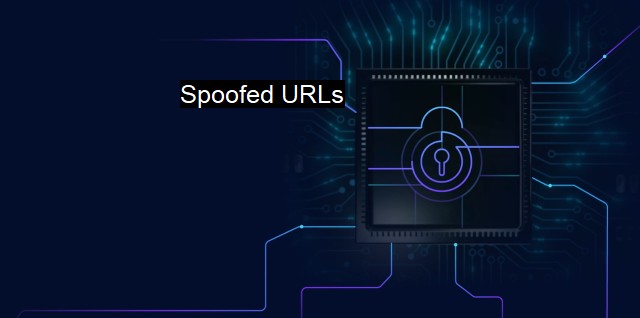What are Spoofed URLs?
Navigating the Threat Landscape: Uncovering the Menace of Spoofed URLs and Tactics to Stay Safe
Spoofed URLs refers to a malicious technique where cybercriminals create fraudulent websites to mimic legitimate ones. The aim of the underlying illegitimate facade is primarily to deceive users into providing sensitive personal information or downloading malicious software. With the internet becoming an integral part of our lives and security threats increasing exponentially, understanding the concept of spoofed URLs is essential to safeguard against such attacks.A simple technique known as URL spoofing forms the base of numerous cybercrimes perpetrated across the globe. In this scheme, cybercriminals replicate and modify the Uniform Resource Locator (URL) of an original, often well-recognized website. These spoofed URLs generally look virtually identical to the authentic ones, typically distinguishing themselves with subtle misspellings, character substitution, or a different domain name. the superficial difference aims to dupe the unsuspecting users into interacting with them, without realizing they're not communicating with the legitimate site.
Spoofed URLs tremendously affect the business world, tarnishing brand reputations and leading to financial losses. Most of the spoofed URL incidents are related to phishing attacks, where they are used as vital gears inside the malicious phishing mechanisms. Victims of these attacks usually receive an email or a message carrying a spoofed URL masked as a link to a trusted online platform like a bank or a shopping site. Assumed to be secure, these links are enticingly designed for unsuspecting users to reveal their personal or financial details unknowingly to fraudsters.
Another widespread practice involving spoofed URLs is for distributing malware and viruses. Cybercriminals inject malicious code in these counterfeit websites which automatically download on to the user's device upon visiting. This could be anything from a virus, worm, ransomware, or any other harmful software. JavaScript-based scams like malvertising, cryptojacking, or drive-by downloads also heavily rely on spoofed URLs. With a multitude of harmful consequences that corresponding malicious software fetches, antivirus measures are required to fight such traps.
Since the identification of spoofed URLs is increasingly becoming a tough task due to their ever-improving deception, equipping your device with a tailored antivirus is crucial. Protecting your device from viruses, Trojans, worms, spyware, and other types of malware helps prevent malicious activities carried out through spoofed URLs and other deceptive measures.
Modern antivirus software integrates various technologies to detect spoofed URLs. The security software first scrutinizes the website's URL and checks it against a list of known spoofed URLs. If a match is found, the website is blocked, and the user is alerted instantly. When the URL passes this stage, the antivirus software continues to visualization technology, heuristic detection, sandboxing technology, etc., to verify the website's legitimate behavior. With these rigorous verifications, the level of protection provided by these antivirus solutions against spoofed URLs is outright commendable.
Apart from the active role of antivirus software, tonnes of passive security measures can help you navigate the internet securely. Crucial practices include carefully examining websites, specifically paying attention to URL before interacting with a webpage. Always check for the padlock or “https” that indicates a secure and encrypted connection. Make use of the browsing tools like security plug-ins, which alert for malicious websites. Always keep your device up-to-date with the latest security patches and firmware.
As societies further globalize and digitize, the need for cybersecurity cannot be overemphasized. In this context, comprehending components such as spoofed URLs is vital in discerning real from sham in virtual environments. Coupled with reliable antivirus software and well-informed digital practices, you can unmask these counterfeit experiences and safeguard your valuable data and peace of mind.

Spoofed URLs FAQs
What are spoofed URLs?
Spoofed URLs are malicious web addresses that are created to look like legitimate URLs. These fake URLs are used by cybercriminals to trick users into thinking that they are visiting a genuine website, while in reality, they are being redirected to a fake website that can steal their personal and sensitive information.How do cybercriminals make use of spoofed URLs?
Cybercriminals use spoofed URLs to conduct phishing attacks and other cybercrimes. With the help of spoofed URLs, they can trick users into divulging their login credentials, credit card numbers, and other sensitive data. They can also use these URLs to spread malware and ransomware through infected links.What can be done to protect oneself from spoofed URLs?
To protect yourself from spoofed URLs, you can take some measures such as: 1. Always double-check the URLs of the websites you visit. 2. Keep your antivirus and security software updated. 3. Use a firewall to block unauthorized access. 4. Don't click on suspicious links in emails or messages. 5. Use two-factor authentication for logins. 6. Educate yourself and your employees to detect and avoid spoofed URLs.What should I do if I encounter a spoofed URL?
If you encounter a spoofed URL, do not click on any links or download any files from the website. Instead, report the URL to your IT department or antivirus vendor immediately. It is also recommended to change your login credentials for any sites or services that you have accessed using the spoofed URL.| | A | | | B | | | C | | | D | | | E | | | F | | | G | | | H | | | I | | | J | | | K | | | L | | | M | |
| | N | | | O | | | P | | | Q | | | R | | | S | | | T | | | U | | | V | | | W | | | X | | | Y | | | Z | |
| | 1 | | | 2 | | | 3 | | | 4 | | | 7 | | | 8 | | |||||||